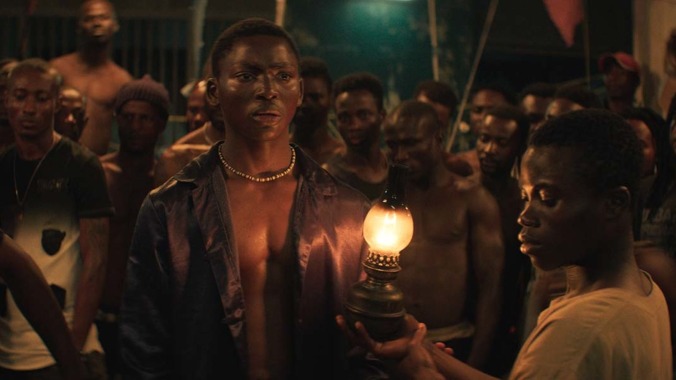It’s not often that a film from the Ivory Coast gets a U.S. release. The politics of film distribution aside, writer/director Philip Lacôte’s
embodies the vast cinematic potential of voices and cultures often overlooked by American gatekeepers. Across its relatively brief running time, the film vividly brings to life the tensions of an Ivorian prison community, while steeping those dynamics in the West African traditions of the griot (they’re essentially troubadours who recount local and family histories through oral storytelling). It’s also a gangster movie that blurs the line between mythology and history, and a portrait of the country’s electoral chaos in the 2010s. Lacôte’s got a lot on his mind, and despite a few missteps, his ambition pays off.
Set in the infamous La MACA prison of Abidjan, the Ivorian capital, Night Of The Kings takes a nameless young pickpocket’s point of view. Played by newcomer Bakary Koné, this shy youngster is new to the joint, and as such functions as a surrogate for the audience, learning the ins and outs of a penitentiary where the inmates themselves make the rules. We learn that the protagonist was once a “Microbe”—one of the lackeys of ruthless real-life kingpin Zama King. But by the look of the other inmates—all teeth-gnashing toughies and menacing weirdos—and the impotence of the security guards, there’s a fat chance our hero lives long behind bars.
The threat to his life comes pretty much instantly, when la MACA leader Blackbeard (Les Misérables’ Steve Tientcheu) deems our newbie the prison’s honorary storyteller, or “Roman.” A burly figure toting an oxygen tank, Blackbeard worries his reign is nearing its end—warring factions led by two much younger and more vigorous candidates threaten to usurp the aging boss. Among several nods to Ivorian political history, this subplot evokes the country’s civil war of the mid-aughts with Shakespearean verve. In hopes of staving off his adversaries, Blackbeard invokes the “Night Of The Roman”: The new storyteller must regale prison audiences with a tale that lasts until the red moon sets; should his filibuster end prematurely, he’ll be killed. Like a modern-day Scheherazade (the famed storyteller of The One Thousand And One Nights, a.k.a. The Arabian Nights ), Roman must depend on his creativity to survive.
At this point the film goes wild, with shifting narrative layers and points-of-view that might leave some confused. As Roman imagines the life and times of Zama King, the inmates prove active listeners; there’s a restless, carnivalesque quality to the proceedings, the rapt audience re-enacting his tall tale with fiery song and dance, jeering or humming in approval. Lacôte transports us into the story itself, which traces Zama’s fiendish exploits in the Lawless Quarter, his royal origins, his spiritual upbringing, and the moments leading up to his assassination. The balancing act here is a bit wobbly. For one, the story within the story feels oddly empty, especially when it steps back into pre-colonial times with a magical CGI-enhanced battle between an African queen and her brother. (It must be acknowledged, at the very least, that this moment is extremely cool.) It’s fascinating to see Roman grow increasingly confident in his storytelling, but the visions he conjure lack the force and urgency of the prison narrative. There’s a disconnect between how captivated his audience seems by the story and the actual experience of seeing it visualized. Watching Zama King’s tale, one might long for a return to the life-and-death stakes of the prison. Despite the extensive backstory he’s provided, Zama King never truly emerges as a character, though perhaps his spectral presence is meant to signify the unattainable past and history’s inability to completely summon it.
Lacôte folds in elements of the supernatural, bolstering the film’s already evocative sense of place and the prison’s haunted-house claustrophobia. (For a quick hit of oddball flavor, the prison also includes among its population the great French shape-shifter Denis Lavant, armed with a chicken on his shoulder.) A legendary outlaw described as “the handyman for the new leaders of the country,” Zama King seems to represent the inevitable downfall of those wielding too much power—Lacôte sprinkles footage of former President Laurent Gbagbo, who refused to step down after his election loss in 2010. But the filmmaker, like Roman himself, understands that fiction is more productive here than a by-the-book history lesson. Roman did in fact know Zama King, but he draws less from his own experiences of the man than what Zama might’ve represented, tapping into people’s dreams and nightmares. Night Of The Kings captures the elusive recent past of Ivorian political turmoil. It’s also, perhaps just as significantly, an entrancingly fun time at the movies.









































